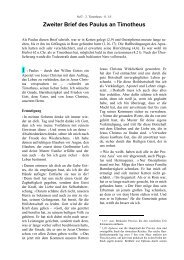You also want an ePaper? Increase the reach of your titles
YUMPU automatically turns print PDFs into web optimized ePapers that Google loves.
a vague grinding sound, not particularly loud at<br />
first, came from somewhere deep within the ship.<br />
The faint jangling of cutlery, laid out for tomorrow’s<br />
breakfast, provided the only other hint of<br />
any disturbance on this so-far-flawless cruise.<br />
Passengers woken by the bump tried to somehow<br />
correlate it with familiar events. Someone said<br />
’That’s funny – we’re docking!’ Another thought<br />
that a heavy wave must have struck the ship. One<br />
woman, awoken by the grinding scrape, said it<br />
was ’as if a giant finger was dragged along the<br />
flank of the ship’. Mrs Astor, the wife of the richest<br />
man on board, thought there must have been<br />
a mishap in the kitchen.<br />
Other than that, there was nothing apart from this<br />
sound, grotesque in its apparent harmlessness.<br />
Some called it a scratching, others a scraping<br />
sound, still others a dragging or even a grinding<br />
noise. Most passengers slept through and heard<br />
nothing. Some leaving the smoking lounge<br />
stepped out on deck just in time to be able to<br />
catch a glimpse of the iceberg scraping alongside.<br />
In the next instant it had disappeared into the<br />
darkness. The momentary excitement soon settled;<br />
the Titanic still seemed as massive and solid as<br />
ever, and it was much too cold to stay outside any<br />
longer. A card game seemed in order.<br />
Till now, it had been a cruise of the purest pleasure<br />
– a liner on its maiden voyage, everything<br />
new and shiny. The confidence which reigned<br />
supreme aboard the mighty vessel had been most<br />
profoundly expressed by one steward to a Mrs<br />
Caldwell: “Even God couldn’t sink this ship.” But<br />
Titanic’s death warrant had been signed. Captain<br />
Edward John Smith didn’t hurry to the radio to<br />
announce the collision, but went first to notify<br />
the billionaire, John Jacob Astor, before anyone<br />
else. This is when Astor is supposed to have<br />
uttered the now-famous words, “I ordered ice,<br />
indeed, but this is ridiculous!”<br />
Over the next two and a half hours, the bow sank<br />
ever deeper, until the enormous weight of the<br />
now-protruding stern caused the vessel to suddenly<br />
break in two. The now-separated bow section<br />
sank first. Shortly after, the stern rose almost<br />
horizontally out of the water, before this portion<br />
122<br />
of the ship, too, plunged down towards the floor<br />
of the icy Atlantic, 3,821 metres below. Since boiler<br />
operators and machinists had been instructed<br />
to keep the machinery for power generation<br />
going as long as possible, all the Titanic’s lights<br />
were shining brightly, some even staying on while<br />
already under water. This eerie illumination of the<br />
silent catastrophe continued right up to just two<br />
minutes before the ship sank completely beneath<br />
the ocean surface.<br />
1522 people lost their lives; only 712, barely a<br />
third of those on board, were rescued. The proportion<br />
of those rescued was significantly different<br />
according to their class (first class: 62%; second<br />
class: 42.5%; third class: 25.5%). Almost<br />
anything else might have seemed conceivable –<br />
the champagne running out, an epidemic breaking<br />
out among the third class passengers, perhaps<br />
even the bandmaster falling asleep. But no one<br />
would have dreamt for a minute that this proud<br />
ship would, on the night of the 14 th through 15 th<br />
April, 1912, after contacting an iceberg, simply<br />
sink and plunge 1500 people into an icy grave in<br />
the North Atlantic.<br />
It was precisely 2:20 a. m. on the 15 th April 1912<br />
when the mighty vessel sank into the depths of<br />
the sea. Since that moment, the Titanic has become<br />
a metaphor for pride preceding a downfall.<br />
In 1985, 73 years after the catastrophe, the wreck<br />
was located, at a depth of 3,800 metres, by Robert<br />
Ballard, underwater geologist at the Woods Hole<br />
Oceanographic Institution in Massachusetts, USA.<br />
Situated south of Newfoundland, it was strewn<br />
over an area the size of the city of London. Resting<br />
in the ocean depths, the Titanic is like some<br />
irresistible emotional powerhouse. Her tragic<br />
story, revisited over and over, has spawned thousands<br />
of books, and some three dozen films –<br />
including the 1997 epic by American director<br />
James Cameron.<br />
Cameron’s blockbuster film “Titanic” turned the<br />
catastrophe into a box-office bonanza. Millions of<br />
moviegoers worldwide shared the experience of<br />
being on board the most renowned passenger<br />
liner of all time during an elaborate cinematic<br />
reconstruction of her sinking. With the largest
















